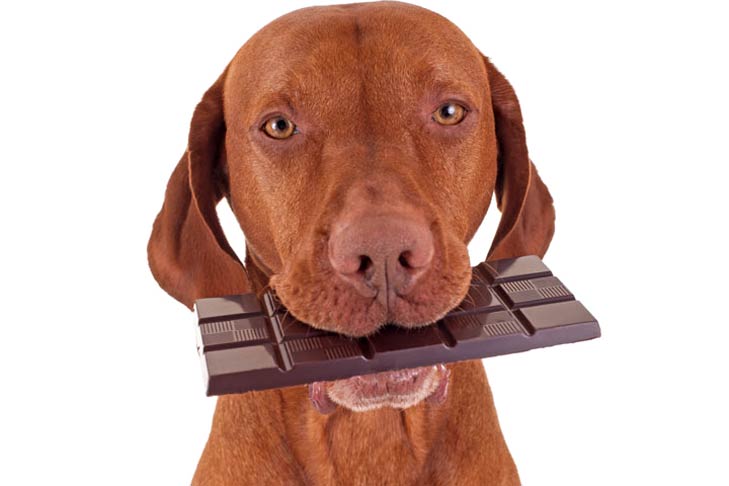
Can Dogs Eat Chocolates?
Chocolate, that delicious sweet that melts in your mouth and not in your hand, also happens to be a favorite of humans and our canine friends alike. But can dogs eat chocolate? The answer is No dogs can’t eat chocolate. There are so many questions that go through your mind when you ask yourself this question, like why can’t dogs eat chocolate? What happens if your dog eats chocolate? So let’s discuss the answers to these questions. A lot of people have been asking this question this is because many dogs are curious and love to explore the world around them. Chocolates can be toxic to dogs, however, and can cause them to become sick or even die. It is important to know how much chocolate a dog can eat before it becomes dangerous. It’s best to avoid giving your dog any kind of chocolate because they contain ingredients that aren’t good for them. If you’re not sure whether or not your dog will be safe eating a specific type of candy or chocolate, consult with your veterinarian before giving it to them.
Why is chocolate dangerous for dogs?
Chocolate no doubt is delicious but it contains certain ingredients that are toxic to dogs. The toxic ingredients in chocolates are:
Theobromine
Theobromine is a stimulant that’s found in chocolate and cocoa. It can be dangerous for dogs because it affects their heart rate, blood pressure, and central nervous system.
Theobromine is naturally occurring in chocolate plants, so it’s not a foreign substance that dogs don’t have any defenses against. When a dog eats chocolate, he will metabolize theobromine more slowly than humans do due to differences in digestion and metabolism. This means that a smaller amount of theobromine can cause toxicity in dogs than it would in humans.
Dogs are also more likely to consume chocolate because they’re attracted to the smell of it, so they’ll eat more than we would if we were eating it ourselves! If you’re concerned about your dog ingesting any kind of chocolate (not just theobromine-containing chocolate), contact your vet immediately for advice about how much is safe for your dog to eat at one time or over time.
Sugar
You might have heard that sugar in chocolate can be harmful to dogs, but it’s not quite as simple as that. Sugar itself isn’t necessarily toxic for dogs; it’s the excessive amount of sugar in some types of chocolate that can be harmful. That said, it may not be worth the risk of feeding your pet any chocolate product—especially dark chocolate, which contains more sugar than milk chocolate. If your dog has ingested some chocolate, call your vet immediately.
Caffeine
Caffeine in chocolate can cause toxicity in dogs. Caffeine is found in cocoa beans, which are used to make chocolate. The more cocoa beans that are used, the higher the amount of caffeine the chocolate contains. Dark chocolate has more caffeine than milk chocolate and white chocolate, which has none.
Dogs who eat some types of dark or milk chocolate might develop vomiting, diarrhea, and restlessness (hyperactivity). If a large amount of chocolate is eaten, dogs may have seizures and die from their symptoms.
Fat
It’s important to remember that not all fat is bad for your dog, and that fat is an essential part of your dog’s diet. Fat helps them absorb vitamins, maintain their coat, and keep their body temperature steady. You should never cut out all fats in your dog’s diet because it could be harmful to them. However, the fat in chocolate can cause pancreatitis in dogs if fed in excess.
Is Sugar-Free chocolate safe for dogs?
Sugar-free chocolate is a tasty treat for humans, but it can be dangerous for dogs.
Sugar-free chocolate contains xylitol, a sweetener that’s safe for humans but toxic to dogs. When consumed by dogs, xylitol causes their blood sugar to drop too low, which can lead to seizures and even death.
Symptoms of chocolate poisoning in dogs
Chocolate is a dangerous substance for dogs. If a dog eats chocolate, he may experience some or all of the following symptoms:
- Vomiting
- Diarrhea
- Stomach pains
- Restlessness
- Irregular heart rate

What to do if your pup eats chocolate?
If your pup eats chocolate, don’t panic. Chances are they’ll be fine. But to help your pup get back to normal health as quickly as possible, it’s important to know what to do if your pup eats chocolate.
Check the label on the chocolate bar or candy wrapper. If it says “milk chocolate,” it contains milk and therefore is not toxic for dogs. However, dark chocolate contains more cocoa solids (the toxic part) than milk chocolate does, so always check the label if your dog has eaten dark chocolate.
If your dog ate chocolate, it is important to talk to your veterinarian right away. Your vet will likely ask you questions about what happened and how much chocolate was eaten. They may also want information about other symptoms, such as diarrhea or vomiting. They may recommend blood tests to see if there are any problems with liver and kidney function.
In some cases, your veterinarian may recommend IV fluids for your dog if he or she has severe symptoms like a fast heartbeat or trouble breathing.
How to stop dogs from eating chocolate?
The best way to stop dogs from eating chocolate is by keeping it out of reach. If you have a dog that loves to munch on chocolate, keep it out of reach at all times. You should also make sure your dog does not have access to anything that contains chocolate, such as baking products or candy wrappers.
Conclusion
Dogs can eat chocolate, but it doesn’t mean they should. While most dog owners have seen their pooch nibble on a chocolate chip or lick melted chocolate off of their owner’s hand, some may be unaware of the possible side effects this can cause. Chocolate contains a mild stimulant called theobromine which can be toxic to dogs. Side effects can include vomiting, diarrhea, and restlessness. So it’s best not to give your dog chocolate.
About the Author:
Savanna Westwood
Savanna Westwood is the Owner and Founder of The Savvy Sitter, Pet Sitting and Dog Walking, LLC. She has grown up with animals all her life and enjoys spending time with them. Savanna has lived in the Winter Garden and Windermere Area for over 30 years. When she is not taking care of Fur Friends, one can find her reading, practicing archery, riding, and devising ways to provide additional and excellent services to clients. Savanna is a Certified Professional Pet Sitter with Pet Sitter International's CPPS certification and also holds certification in Pet First Aid and CPCR for Pet-Care Professionals.

